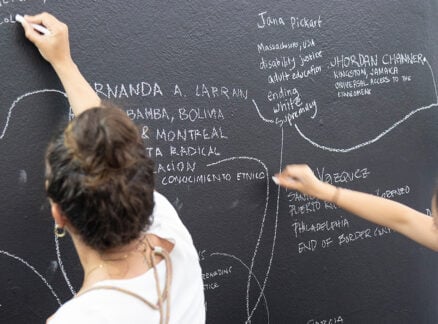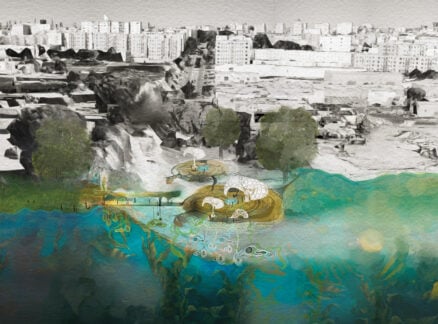January 1, 2012
Katie Salen’s Video-Game Charter Schools Make Learning An Adventure
Using a game-based curriculum, Salen is challenging—head-on—education’s unhealthy reliance on tests.
OCCUPATION: Game designer, educator, author
AFFILIATIONS: CICS ChicagoQuest, Quest to Learn
LOCATIONS: Chicago and New York City
Sixth graders in Chicago’s new charter school, CICS ChicagoQuest, learn math and writing through a curriculum called Digiton. The students’ mission—to restore “rationality” to a mysteriously dysfunctional town—is presented in a series of quests: learn algorithms to fix Digiton’s broken harvesting machines and shuttered mines, write and edit the town newspaper, create a conversion dictionary so the Digiton townsfolk can understand fractions. The missions are designed to inspire students to want to learn, in order to break secret codes, fix things, and get to what gamers would call the next level. “A teacher told me that in class you can hear a pin drop,” says the game designer Katie Salen, a professor at DePaul University and the executive director of the Institute of Play, which helped start the school. “The kids are working like mad on these worksheets. Parents are saying their kids are coming home with all this homework, and they’re super eager to do it.”
The middle school, dubbed the “video-game charter school” by locals, opened last September, on the heels of its sister school, New York City’s Quest to Learn. Both use a curriculum based on game theory, design principles, digital media, and “challenge-based learning,” as Salen describes it. Rather than settling for the default view that teaching is a matter of providing the knowledge that will get kids through standardized tests, challenge-based learning drops students into complex problems that they solve—often collaboratively—through a series of missions sequenced over a ten-week period. Challenges typically combine disciplines, such as Digiton’s use of math and English-language arts, and call for complex problem-solving skills, systems thinking, initiative, feedback, and empathy.
Salen’s deep-seated belief in games as a tool for learning extends beyond her work as a game designer and educator: from books (the seminal Rules of Play among them); to Quest to Learn, the New York–based public middle school founded in 2009; to the Institute of Play, the nonprofit she founded in 2007. The Institute of Play has developed—alongside school curricula—a game-design summer camp and an after-school program. It also owns the award-winning online adventure game Gamestar Mechanic.
Salen sees a “terrible misalignment” between how kids are being educated in our teach-to-the-test culture and the demands of colleges and workplaces. “Some kids have become excellent at taking tests and at being passive recipients of information: ‘I don’t have to think; the teacher is going to tell me what I need to know to pass the test,’” Salen says. “They’ve never been put in situations where they have to solve problems, think on their own, or be in charge of their own learning. So they go to college or into jobs, and suddenly their manager is asking them to solve something, and they have no skills.”
Starting a school is no easy feat. But starting one based on the idea that video games have something to teach us about learning is especially difficult because it counters what many parents consider common sense: that games are only for fun. And Salen has worked hard to play down the public perception that she is starting video-game schools—where kids stare at screens, twitching their fingers on consoles all day. Fortunately, she has the backing of some leading educational research, and the financial support of the MacArthur Foundation. “We were in the middle of a relatively traditional school-reform initiative,” says Constance Yowell, the director of education for U.S. programs at MacArthur. “Unfortunately, after working in three districts for four years and investing $30 million, we saw little change. We decided we wanted to take a different approach and take a look into the future and understand how young people use digital media. Through both ethnographic and quantitative research, we quickly learned that this isn’t about the future—it’s about now. Young people are learning in extraordinary ways outside of school with digital media.”
The Chicago-based foundation funded a series of research projects as part of a $50 million initiative in digital media and learning—including Quest to Learn, Salen’s “digital school for kids.” Focusing on sixth through eighth grades, the years when many young people (especially boys and minority kids) become disaffected with school, Quest to Learn reimagined the classroom as one learning space within a network of learning spaces that extends beyond a school’s gates. Its goal was to set up complex problems that are structured to deliver “just-in-time learning”—kids learn what they need to work on, where to go next, and how they are doing, much as video games teach players how to play as they go. Today, the Quest to Learn school’s Wi-Fi–enabled building hosts 235 students, has a long waiting list, and has “better than average” performance scores across the city, according to Salen. More important to her is an independent 18-month study that found that Quest to Learn students scored high on collaboration, time management, and systems thinking. “We call ourselves ‘standards-plus,’” Salen says. “We’re not training test takers. We care more that students are excelling in twenty-first-century competencies.” Mayor Richard M. Daley was impressed enough to want such a school in Chicago.
One of Salen’s many compelling qualities is an ability to deliver radical ideas about education in a quietly informal and playful manner. Yowell recalls seeing her present in front of a group of funders. Salen asked, “What do games have to teach us about pedagogy?” Yowell says that “No one had a response. It was gutsy thing to do in front of funders—asking them a question that they hadn’t thought about. More importantly, it was exactly the right question to ask. Katie is brave and forward thinking—what education desperately needs.”
It will take a lot more forward thinking to unseat the dominant mind-set on education and how to fix it. A recent Bloomberg Businessweek article on education lined up industry experts—none teachers—and began with the former IBM executive Louis Gerstner’s prescription: longer school days, better standards, better ways of measuring standards, and better teachers. In contrast to that, Salen’s schools prioritize the learning experience. In a PBS documentary on twenty-first-century learning, John Perry Barlow made a compelling argument for change: “The need to memorize something is a twentieth-century skill. The need to navigate in a buzz of confusion, and to figure out how to trust the information that you find—if you can feel confident doing that, the world is yours.” Salen’s project, of course, was the first school featured by the program.





